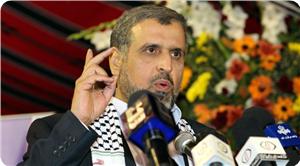Islamic Jihad Leader Shallah: The Palestinian people will achieve victory in this battle

 The Secretary General of the Islamic Jihad Movement Ramadan Abdullah Shallah said that the Palestinian people will defeat the Israeli occupation in this battle despite the regional and international conspiracy and complicity.
The Secretary General of the Islamic Jihad Movement Ramadan Abdullah Shallah said that the Palestinian people will defeat the Israeli occupation in this battle despite the regional and international conspiracy and complicity.
In a televised speech at dawn Monday, Shallah stressed that the Palestinian resistance will remain the only protector of its people.
He said, addressing the Palestinian people, that the Palestinian resistance will achieve victory with Allah’s help despite all the ongoing plots, betrayals, and pressures.
He renewed his total adherence to resistance weapons, hailing the legendary steadfastness of the Palestinian people and resistance.
“We will not stop fighting our enemy until meeting our demands and legitimate rights to live with freedom and dignity,” Shallah said.
He hailed the resistance factions’ armed wings especially the Qassam Brigades and the Quds Brigades. “We will never let you down”, he stressed.
He said that the Palestinian resistance had defeated the Israeli enemy at the military, security, political, strategic, and moral levels thanks to the steadfastness of the Palestinian people in Gaza.







